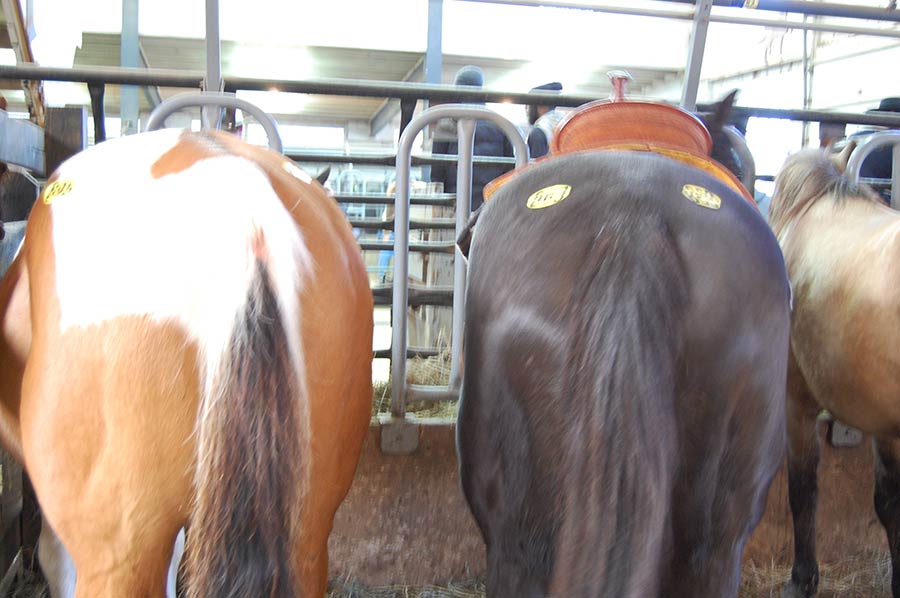
Legislation to criminalize horse slaughter for human consumption and the related cross-border transportation of equines has once again been introduced in the U.S. Congress.
This time though, horse welfare advocates say, they are more confident in its chances for passage than ever before.
“I’m no Pollyanna, but the issue is at a tipping point,” said Sara Amundson, president of the Humane Society Legislative Fund, the legislative organization affiliated with The Humane Society of the United States. “This is the first year on record that the agriculture appropriations committee has agreed on language in the Farm Bill that the U.S. Department of Agriculture will not be funded for future inspection of horse slaughter facilities.”
Sen. Bob Menendez (D-NJ), lead sponsor of the John Stringer Rainey Safeguard American Food Exports (SAFE) Act, said the time has come to ban horse slaughter in the U.S. once and for all.
“The gruesome practice of slaughtering horses for food has no place in the United States, and it’s well past time for Congress to say once and for all that horsemeat is not what’s for dinner,” said Sen. Menendez, a longtime advocate for animal rights. “Horses are routinely treated with drugs that are dangerous for human consumption and do not belong in our nation’s food supply. Our bipartisan legislation will help put an end to the cruel and inhumane slaughter of horses while protecting families.”
The Safe Act, which has been introduced every session since 2006, would make it illegal for anyone to knowingly transport, purchase, sell, possess, ship or receive any horse with the intent of slaughtering the animal for human consumption. The bill would also codify penalties, including fines and imprisonment, for individuals who violate the law.
Even with bipartisan support, Menendez said through a spokesman that under the current Senate leadership, getting a full Senate vote will be “extremely challenging.”
Nevertheless, Amundson said public opinion is overwhelming on the side of protecting horses.
“Eighty percent of Americans polled say they want to put the issue to bed permanently,” she said.
With no plants operating in the U.S. horses sold to so-called “kill buyers” are shipped thousands of miles across the borders to Canada and Mexico, enduring cramped and dangerous conditions in trailers, to be butchered for their meat.
The National Agricultural Statistics Service at the U.S. Department of Agriculture (USDA) reveals that more than 100,000 American horses are exported to Canadian and Mexican slaughterhouses each year.
The American Horse Council (AHC) remains neutral on legislation on the slaughter of horses for human consumption, said Cliff Williamson, director of Health & Regulatory Affairs for the AHC.
“The AHC operates on a consensus basis and the US horse industry is still evenly split on this issue,” he said. “We do endeavor to stay informed and provide what information we gather to our members so they can educate their membership as the issue evolves.“
Kelly Smith, Omega Horse Rescue and Rehabilitation Center, in Airville, PA, said she hopes the SAFE Act will make it through this session. “I’d love to see horse slaughter ended in my lifetime,” she said. “Until we get it passed, we will continue to find ways to alleviate the suffering.”
Smith is working with the Pennsylvania Equine Council and Penn Vet’s New Bolton Center to try to find a location to provide humane and affordable euthanasia options for horse owners in need.
She said people need a viable option so they don’t take horses to auction as a last resort.
“People can’t afford to humanely euthanize their horses,” she said. “I hear that a lot.”
And both Smith and other horse rescue operators say overbreeding is another problem that fuels the slaughter pipeline.
“Organizations need to encourage members who engaged in over-breeding that if there was more responsible breeding the number of horses would decrease. People want to blame the kill buyer but he’s the cleanup person for what’s happening, not the cause.“
“I think this legislation will improve the lives of American equines greatly,” said Jackie Burke, executive director of Last Chance Ranch in Quakertown, PA which has rescued 1,500 equines in the past 20 years.
She said establishing a funding stream to help rescues, possibly with proceeds from high-profit equine industries like horse racing and competitive events, would greatly increase the ability of struggling rescues to expand the number of horses they can help.
“It seems like the trend of neglect is unfortunately rising over the years,” said Burke. “Each year we receive many neglected equines in need of immediate veterinary care. Often times these horses are coming out of kill pens, auctions or from animal control.”
Amundson is hopeful the SAFE Act, which has 180 co-sponsors in the House and Senate, can move through the committee process this fall, especially given that one of the sponsors is Sen. Lindsey Graham, chairman of the Judiciary Committee. “Then we may see gain traction it needs to move across the finish line,” she said.




